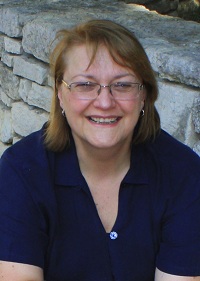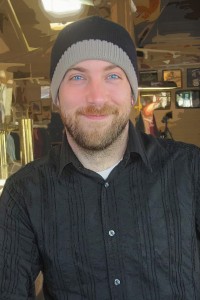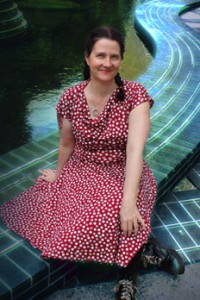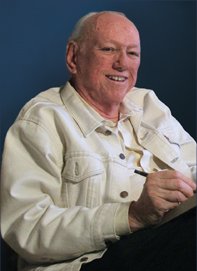Tanya Huff: Builder
 Tanya Sue Huff was born September 26, 1957 in Halifax, Novia Scotia and grew up in Kingston, Ontario. She made her first sale at age ten – two poems to The Picton Gazette. She joined the Canadian Naval Reserve, where she served as a cook from 1975-79. She attended Ryerson Polytechnical Institute in Toronto, graduating in 1982 with a degree in Radio and Television Arts, part of the same graduating class as Robert Sawyer. She worked in game and bookstores in Toronto in the ’80s and early ’90s, including famed SF bookstore Bakka-Phoenix. In 1992, she moved out of the city and became a full-time writer. She lives in rural Ontario with her wife of 23 years, writer Fiona Patton.
Tanya Sue Huff was born September 26, 1957 in Halifax, Novia Scotia and grew up in Kingston, Ontario. She made her first sale at age ten – two poems to The Picton Gazette. She joined the Canadian Naval Reserve, where she served as a cook from 1975-79. She attended Ryerson Polytechnical Institute in Toronto, graduating in 1982 with a degree in Radio and Television Arts, part of the same graduating class as Robert Sawyer. She worked in game and bookstores in Toronto in the ’80s and early ’90s, including famed SF bookstore Bakka-Phoenix. In 1992, she moved out of the city and became a full-time writer. She lives in rural Ontario with her wife of 23 years, writer Fiona Patton.
Huff’s first professional fiction sale was ‘‘Third Time Lucky’’ to Amazing Stories in 1985. Most of her novels are series works, including her debut, the Wizard Crystal series, Child of the Grove (1988) and The Last Wizard (1989). The Victoria Nelson/Blood Books series of vampire novels began with Blood Price (1991), and continued with Blood Trail (1992), Blood Lines (1993), Blood Pact (1993), Blood Debt (1997), and collection Blood Bank (2008). The series was adapted for TV as Blood Ties (2007). The spin-off Smoke series has Smoke and Shadows (2004), Smoke and Mirrors (2005), and Smoke and Ashes (2006). Her Quarters series is Sing the Four Quarters (1994), Fifth Quarter (1995), No Quarter (1996), and The Quartered Sea (1999). The Keeper’s Chronicles includes Summon the Keeper (1998), The Second Summoning (2001), and Long Hot Summoning (2003). Her Valor military SF series began with Valor’s Choice (2000) and continued with The Better Part of Valor (2002), The Heart of Valor (2007), Valor’s Trial (2008), and The Truth of Valor (2010). The Enchantment Emporium trilogy is The Enchantment Emporium (2009) and The Wild Ways (2011), with a third volume, The Future Falls, forthcoming. Standalone novels include Gate of Darkness, Circle of Light (1989), The Fire’s Stone (1990), and werewolf novel The Silvered (2012).
Some of her short work has been collected in What Ho, Magic! (1999), Stealing Magic (1999), Relative Magic (2003), Finding Magic (2007), and in e-collections Nights of the Round Table: And Other Stories (2011), February Thaw: And Other Stories of Contemporary Fantasy (2011), and Swan’s Braid: And Other Tales of Terizan (2013). She also co-edited anthology Women of War (2005) with Alexander Potter, and wrote gaming tie-in novel Ravenloft: Scholar of Decay (1995).
Excerpts from the interview:
 ‘‘There are certainly more strong female characters in fiction today than there used to be and, clearly, more awareness of the issue can only help. Last spring, I was a keynote speaker at a SF symposium in Toronto, and one of the things I discovered researching my talk was a study that determined that 80% of all fiction readers in the US and the UK are women. Readers of science fiction and fantasy, however, are predominately male. So, I asked, if men are only 20% of the whole, shouldn’t we be trying to pick up the 80% of readers we’re not reaching? After I finished speaking, one of the men in the audience wanted to know if I wasn’t afraid that writing strong female characters meant I’d lose male readers. And I said ‘At a 20/80 split, why should I care?’
‘‘There are certainly more strong female characters in fiction today than there used to be and, clearly, more awareness of the issue can only help. Last spring, I was a keynote speaker at a SF symposium in Toronto, and one of the things I discovered researching my talk was a study that determined that 80% of all fiction readers in the US and the UK are women. Readers of science fiction and fantasy, however, are predominately male. So, I asked, if men are only 20% of the whole, shouldn’t we be trying to pick up the 80% of readers we’re not reaching? After I finished speaking, one of the men in the audience wanted to know if I wasn’t afraid that writing strong female characters meant I’d lose male readers. And I said ‘At a 20/80 split, why should I care?’
‘‘That said, I have a fairly strong male readership, although it probably does skew 60/40 women. I was a little afraid the Enchantment Emporium books wouldn’t sell to men at all, because they’re very female oriented – the men are clearly subservient to the women’s power. But when I mentioned book three at a reading, it was a man in the audience who seemed happiest and wanted to know when it was coming out. In many ways, women have been trained to identify with male characters, but I think that over the last decade or so male readers are being trained, however reluctantly, to identify with female ones.”
…
‘‘The Valor books were a reaction to noticing that in almost all military SF, the protagonists are officers. We’ve never had an officer in my family. My mom was Navy, my dad was Navy, my mother’s dad was Navy, my father’s step-dad was career Army, and not an officer in the bunch. I went into the Canadian Naval Reserve as a cook in the ’70s, just as they opened up the trade to women. The alternative would’ve been parachute packing and that would’ve been a disaster on a lot of different levels. I’m not good at make-work, but cooking is an essential job in the military even in peace time – especially if you’re Navy. If you’re miles out to sea you can’t blow off dinner and go to McDonald’s.
‘‘In the military, the officers come up with the plan, but it’s the NCOs’ (Non-Commissioned Officers) job to execute it. It’s their job to guide junior officers, and, generally, if there’s a failure in the officer corps, the problem happens at the senior NCO level, because it’s the senior NCO’s job to take these raw officers out of training and turn them into someone you’d be willing to follow.
‘ ‘So I wanted to write books from the position of the person who’s actually in the middle of things – the person whose job is to carry out the orders of the officers and get everybody home alive. Arguing politics is not the NCO’s job; their job is to make sure that these 19-year-olds don’t die, while the objectives they’ve been given by their officers are being realized. You wouldn’t know it reading most military SF, but the way military structure works is that the higher the rank, the fewer people there are at that level. Which makes looking at Star Trek interesting because they have a billion captains, they call up an admiral any time they need one, and in all the Star Trek universe there’s one chief warrant officer. Clearly Miles O’Brien is the man in charge.”
‘So I wanted to write books from the position of the person who’s actually in the middle of things – the person whose job is to carry out the orders of the officers and get everybody home alive. Arguing politics is not the NCO’s job; their job is to make sure that these 19-year-olds don’t die, while the objectives they’ve been given by their officers are being realized. You wouldn’t know it reading most military SF, but the way military structure works is that the higher the rank, the fewer people there are at that level. Which makes looking at Star Trek interesting because they have a billion captains, they call up an admiral any time they need one, and in all the Star Trek universe there’s one chief warrant officer. Clearly Miles O’Brien is the man in charge.”
…
‘‘When I start a book, I start with a beginning and an end. As I write, I make notes of plot points below the text I’m working on. When I finish a chapter – because I work in chapter files; the thought of dragging the whole book with me every day gives me hives – those bits get moved to the next chapter. Usually, about three chapters from the end, things are completely plotted out – and with nearly every book, those three chapters have turned into six chapters. I’m really bad at judging how much story I have left. Generally, my first draft is 95% of my final draft, because I edit while I write. I’ve never been able to just write it all out and then worry about making it pretty later.
‘‘I believe that there’s two types of writers: the brick-layer and the house-framer. Brick-layers have to get every brick in the right position, or three rows up, the wall falls down. That’s the way I write and, usually, if I find myself not able to move forward it’s because something’s wrong a few rows down. The house-framer, however, throws up the frame, tucks in some insulation, throws on the drywall, does some taping, some mudding – every section is another rewrite, and finally you have a finished house, carpets down, drapes hung. That said, I certainly don’t think there’s a right way or a wrong way to write. I mean, if you have to write standing on your head in the bathroom – that’s the right way for you.”
…
‘‘I have finally finished the third Enchantment Emporium book. It was late, but after 28 books (a book or two a year since 1988), my wonderful, amazing, understanding publishers were willing to cut me some slack. Hopefully, The Future Falls will be out in 2014. Let me now be a cautionary tale for the young: never write a book because you and your editor had a clever idea while talking on the phone. One clever idea is not enough to support a book. A third of the way in, I realized, ‘I don’t have the faintest idea what I’m doing.’ And it was the third book in a series, so I hadn’t done those months of research, because it had already been done. I was making bricks without straw, and every time it rained, I lost the whole wall.”







I was a frequent visitor to Bakka when Tanya worked there.
I had her autograph a copy of Amazing Stories, with her story
“Third Time Lucky” which I still have.
It is in the Nov. 1986 issue.